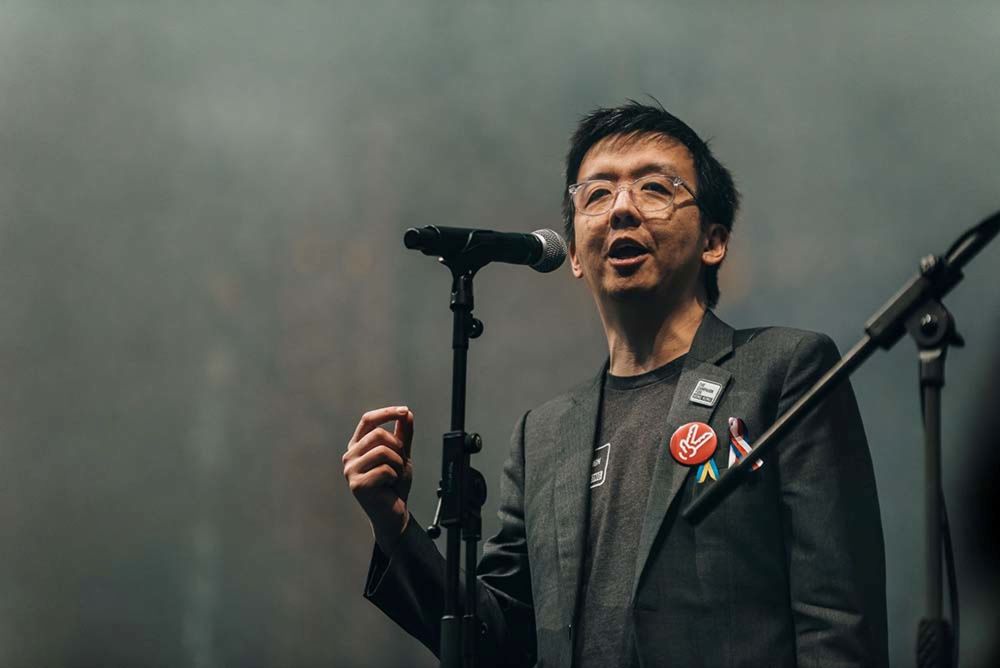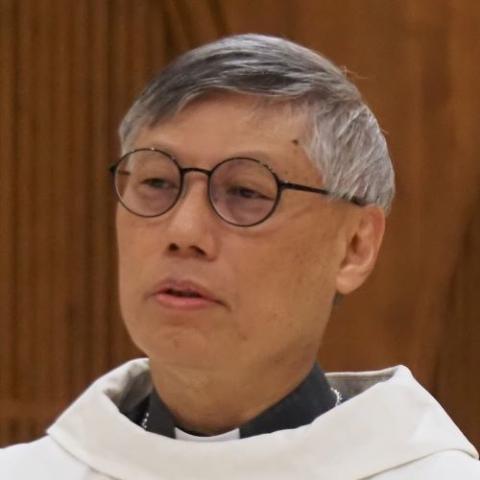
Samuel Chu, an advocate for human rights and democracy in Hong Kong, met recently with Vatican officials to discuss what he says are its "dangerously misguided" policies on China. (Courtesy of Samuel Chu)
At the start of the 2014 pro-democracy protests in Hong Kong, Baptist Minister Chu Yiu-ming and retired Cardinal Joseph Zen were among the activists forced to eventually surrender to police for their efforts in calling for free elections.
Now, You-ming's son, Samuel Chu, has taken his case for Hong Kong democracy to Rome, warning Vatican officials of what he believes are the consequences of its 2018 bilateral agreement with China over the appointment of Catholic bishops in the country. For Chu, the Vatican's controversial China deal has come at the cost of remaining silent on threats to human rights and diminishing religious liberty, both in Hong Kong and mainland China.
"The silence is deafening to me," said Chu, who is founder of the Campaign for Hong Kong, a group that advocates for greater American leadership in advancing human rights and democracy in Hong Kong.
Chu, 45, was born in Hong Kong when the city was still, in part, a fishing village. His father started a storefront Baptist church that helped poor and marginalized residents and later led an effort to help Chinese dissidents involved in the 1989 Tiananmen Square protests to escape the country via Hong Kong.
Because of his father's political activity, Chu was sent to live and study in the United States at age 12. Even so, his father's activism is in his DNA.
Despite being involved in a number of politically progressive causes and generally very supportive of Pope Francis, Chu says he believes the Vatican is dangerously misguided on China.
"My message to the church today is whatever deal you think you have isn't worth the paper that it's drafted on," he told NCR on May 15 following a series of meetings organized by the U.S. Department of State Department with the Vatican's secretariat of state.
Exhibit A, he says, is the way Beijing has backtracked on its recognition of Hong Kong, following the British handover to China in 1997. While the original governance agreement was for "one country, two systems," Beijing has been widely criticized for breaching the accord.
Chu asked, "Do you want to trust a deal" made with the same people who have a history of breaking them?
In recent years, experts have warned that the situation in China for its estimated 10-12 million Catholics has seemingly deteriorated, with church demolitions and crackdowns against Catholic priests. Further, the Vatican has said very little about China's genocide against the Uighur population, a predominantly Muslim ethnic minority group, and China's repression of Tibetan Buddhists and of other Christians in the country.
Chu says that he likes to quote former Speaker of the House Nancy Pelosi who frequently warned that "If we choose not to speak about human rights issues in China because of profit, then we lose all of our authority to speak about human rights everywhere."
"I see that in the Vatican," he said, asking if the Vatican's China agreement is "worth the price of having to gloss over clear religious oppression across the board?"

Hong Kong Bishop Stephen Chow made his first visit as a bishop to the Chinese mainland April 17-21. (CNS/La Civiltà Cattolica/Diocese of Hong Kong)
While Hong Kong remains a relatively free place to practice one's faith, Chu said that following China's passage of its 2020 security law, which deeply limits freedom of speech, people of faith are now silenced and unable to express concerns about other diminishing liberties.
"I have no doubt if anyone, even lay leaders, speak out, they would be arrested," Chu said, pointing to the recent sentencing of figures like Cardinal Zen and pro-democracy media mogul Jimmy Lai, who also is Catholic.
Last month, Hong Kong's Bishop Stephen Chow became the first bishop to visit the country's mainland since the former British colony was returned to China. In an interview with the Jesuit journal La Civiltà Cattolica upon his return, Chow stressed that the Chinese government has much respect for Pope Francis, despite recent violations of its agreement with the Vatican.
Chu dismissed these statements, warning that "it's a very fine line where the church can easily be co-opted as part of the state's security apparatus."
Advertisement
The Chinese Communist Party, he said, seeks to control every area of life and "the church penetrates into the everyday life of communities." By controlling who leads the church, he cautioned, the church essentially becomes an expanded part of the state's messaging and surveillance apparatus.
In the same way that the Beijing Olympics were boycotted and protested by those who accused the world of "sportswashing" China — allowing oppressive regimes to host major sporting events to help improve their reputation — Chu said the Vatican should be wary of what he described as "faithwashing" the Chinese Communist Party.
The Vatican's current posture toward China, he said, risks "essentially baptizing or washing away the sins of the regime."







